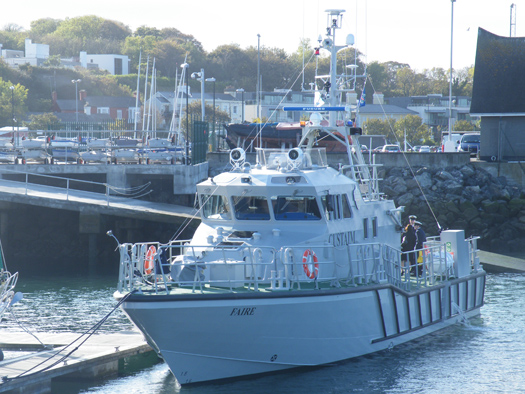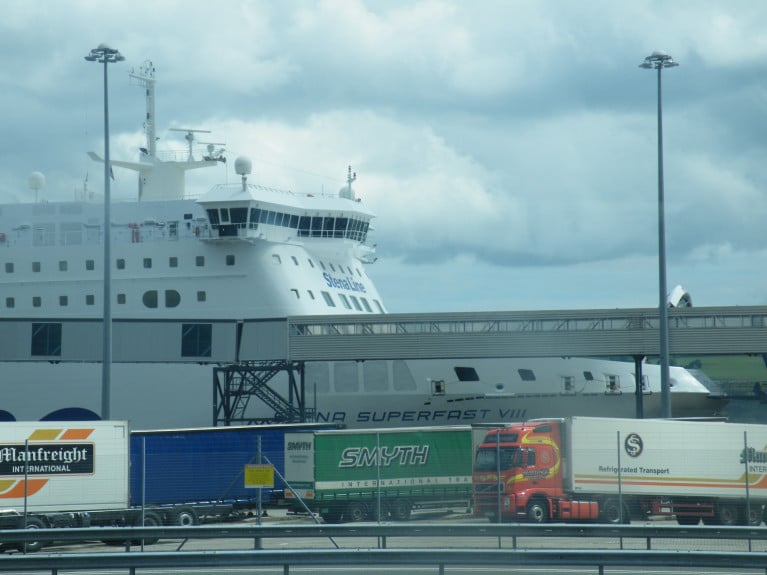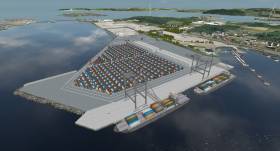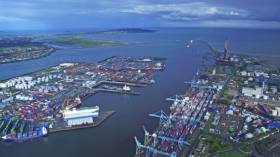Displaying items by tag: Customs
N.I. Protocol: EU Proposes Legal Footing for 50% Cut in Formalities
A proposal by the EU to make a 50% cut in customs formalities on goods moving from Britain to Northern Ireland become a legal obligation, RTÉ News understands.
EU negotiators want the offer to be legally enshrined in a formal co-decision with the UK in order to remove any doubt that the offer to cut customs formalities is meaningful.
The Northern Ireland Protocol requires checks and controls on goods moving from Great Britain to Northern Ireland so as to avoid the need for a hard border on the island of Ireland.
The UK and unionists want the Protocol to be renegotiated or scrapped altogether because of the disruption to trade and the impact on the unionist sense of identity.
The UK's chief negotiator David Frost has so far dismissed the EU's offer to cut formalities by 50%, arguing that it would not represent a significant cut in the process of moving goods between Great Britain and Northern Ireland.
For much more click here.
What Irish Boaters Need to Know About Buying Vessels From & Cruising In Great Britain
Some Irish boat-buyers may be able to purchase new or second-hand vessels from the UK free of VAT.
But for most yacht-shoppers, Brexit has pushed the cost of buying much higher — just as it’s done for the used car market.
In response to a number of queries from concerned readers, Afloat.ie understands that the UK’s Sailaway boats scheme could be an option for some buyers, provided they will sail or motor their pleasure craft from the UK to Ireland and will keep it permanently outside the UK.
This scheme is not applicable to boats purchased for commercial use or transported as cargo. For these and all over new vessels, Customs Duty (including import VAT at 21%) will apply.
An exception exists for some second-hand vessels where the UK VAT was paid before the end of the Brexit transition period.
If an individual in Ireland bought a second-hand boat in Great Britain, on which UK VAT had been paid, and the deal was completed and the boat brought to Ireland before 11pm on 31 December 2020, it is Afloat.ie's understanding that the buyer will not owe Irish VAT on the purchase.
All purchases since that date are subject to Irish VAT, however.
It's also understood that second-hand boats purchased from Northern Ireland are not subject to additional VAT if proof can be shown that the vessel has paid VAT and had been owned by an NI resident. But this would not apply to any vessel imported from the UK through Northern Ireland.
Online customs charges are another potential complication for Irish shoppers browsing the UK boat marketplace.
While the Brexit trade deal agreed in December exempts goods made in the UK from customs charges in Ireland, duty will be payable on many products that have been imported into the UK from elsewhere.
Irish VAT will be payable regardless on all packages valued at €22 or more (including postage) until 30 June 2021, after which VAT will be paying on all goods entering the EU irrespective of value.
Afloat.ie understands that the future tax status of boats now depends on where they were as the Brexit transition period ended.
Those in Ireland at that time, regardless of nationality, retain the status of “Union goods” and can — nominally at least — move freely in EU waters.
Those that were in the UK, however, now face numerous restrictions on future movement — not limited to new VAT liability.
Boats in Northern Ireland are for now recognised as having both UK status and “union status” — a move which averted a potential influx of visiting boats and concerned owners into Irish marinas over the Christmas period.
Businesses seeking to import new or second-hand boats from the UK to Ireland will have to register for an Economic Operators Registration and Identification (EORI) number and complete various customs declarations.
Rules for Irish boaters cruising to British waters (and vice versa) are not yet as clearly defined.
While there has been no change for those cruising between Ireland and Northern Ireland, boaters crossing from Ireland to Great Britain (and vice versa) are strongly advised to keep proof of VAT-paid status on board at all times, as well as complete form C1331 for HM Revenue & Customs.
All arrivals in Great Britain from Ireland (except Northern Ireland) must also hoist flat Q on first arrival and keep it flying until clearance is granted via the National Yachtline (charges may apply).
Temporary admission of a UK vessel for private use into Ireland (including spare parts for minor repairs or servicing) is allowed “without formality” for a maximum of 18 months.
Sailboats and equipment may also be imported temporarily for sports events, but paperwork (such as an ATA Carnet) may apply.
Update 9/2/21: This story was updated to clarify a point around VAT liability on second-hand boats purchased from Great Britain before the end of the Brexit transition period. Thanks to Norman Kean for his assistance.
A doubling in the size of the customs building the Irish Examiner reports is planned by the Port of Cork at its Ringaskiddy terminal due to the increasing likelihood of a hard Brexit.
“We have to plan for the worst now at this stage,” said Port of Cork chief executive Brendan Keating.
Already, a large number of HGVs from the North use ferry connections from Cork to get to Brittany in France and Santander in Spain. If a hard Brexit occurs, it is likely that increased HGV traffic will use the routes out of Cork.
The Port of Cork is investing €85m in developing expanded cargo-handling facilities at its deepwater terminal Ringaskiddy. It has successfully applied to Bord Pleanála to increase the size of a previously permitted customs’ inspection building at Ringaskiddy from 324sq m to 648sq m, primarily in light of the uncertainty over Brexit.
“We have to have the capability to put the necessary checks in place,” Mr Keating said, adding that, if a hard Brexit occurs, there is likely to be more demand for freight and cargo to transit via Dublin and Rosslare ports as well.
The newspaper has more here
New Dublin Port Customs Check Posts Will Be ‘Pinch Point’ Says CEO
New customs checkpoints in Dublin Port are expected to be a ‘pinch point’ for hauliers, according to the port company’s chief executive.
Eamonn O'Reilly tells RTÉ News that delays are likely to result from the new border inspection posts as Brexit would see a dramatic overnight increase in non-EU trade.
The new checkpoints are the first to be built in the port for decades, as their necessity waned in the 1990s thanks to free trade within the EU.
As previously reported on Afloat.ie, all sea freight requiring checks post-Brexit will be inspected at a 13,000m warehouse formerly owned by businessman Harry Crosbie.
New series of 'Customs' on RTÉ One
The second series of 'Customs' returns to television screens next Wednesday (17 November) on RTÉ One at 8.30pm. The Revenue Commissioners customs cutter, RCC Faire, which officially entered service in October of last year, will feature in the new series.

RCC Faire at Howth Harbour on the day of her naming ceremony on 16 October 2009. Photo: Jehan Ashmore / ShipSNAPS
To be broadcast in six-parts, the series will provide unprecedented access into the daily operations of the custom officers.'Customs' examines how the country is dealing with increasing levels of illegally imported materials and substances.
Custom officers found shipments of drugs in the strangest places: a doll's house, picture frames, the bottom of a massive cargo ship. In addition the seizure of contraband cigarettes, vehicles, large
quantities of money and the more bizarre discovery of a Colombian snake.
New series of 'Customs' on RTÉ One
To be broadcast in six-parts, the series will provide unprecedented access into the daily operations of the custom officers.'Customs' examines how the country is dealing with increasing levels of illegally imported materials and substances.
Custom officers found shipments of drugs in the strangest places: a doll's house,picture frames, the bottom of a massive cargo ship. In addition the seizure of contraband cigarettes, vehicles, large quantities of money and the more bizarre discovery of a Colombian snake.



































































